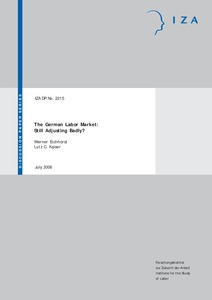The German labor market: still adjusting badly?
"In the late nineties, Germany was often seen as a laggard with respect to labor market and welfare state reforms with institutional inertia being reflected in notoriously sluggish employment growth and rising unemployment. Recent years, however, saw a complex sequence of reforms with regard to...
| Main Authors: | , |
|---|---|
| Institution: | ETUI-European Trade Union Institute |
| Format: | TEXT |
| Language: | English |
| Published: |
Bonn
2006
IZA |
| Subjects: | |
| Online Access: | https://www.labourline.org/KENTIKA-19133352124919515349-The-German-labor-market-still-.htm |
| Summary: | "In the late nineties, Germany was often seen as a laggard with respect to labor market and welfare state reforms with institutional inertia being reflected in notoriously sluggish employment growth and rising unemployment. Recent years, however, saw a complex sequence of reforms with regard to labor market-related institutions such as labor market regulation, social benefits, active and activating labor market policies and attempts to reduce the burden of payroll taxes and – last but not least – a series of changes in collective bargaining. The paper shows if and to what extent labor-market related reforms in Germany have in fact contributed to overcoming structural weaknesses of a Continental European ‘welfare state without work’ and creating an institutional setup more conducive to strong employment growth and lower unemployment. We provide a detailed institutional analysis of the most relevant reforms in both public policies and collective bargaining and evaluate their effects on labor market structures and dynamics that can be identified so far. In particular we focus on the development of different types of employment and raise the question whether these upcoming non-standard forms of employment may be sustainable with respect to the future of the German labor market." |
|---|---|
| Physical Description: | 39 p. Digital |

